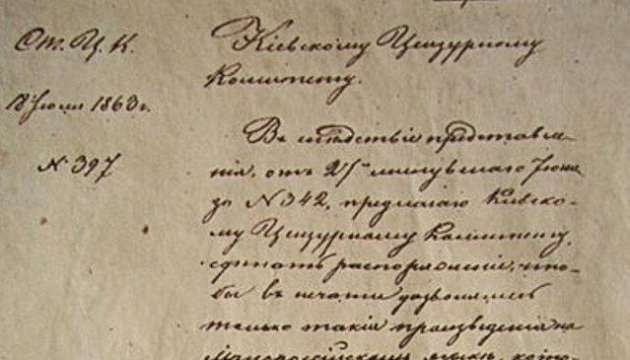
This day in history. The Ems Ukaz as attempt to destroy Ukrainian culture
This was not the first attempt of the Russian Empire to suppress the Ukrainian culture and language and, ultimately, the very national idea. The Ems Ukaz followed the notorious Valuev circular of 1863 to supplement its basic provisions. One of the formal reasons for the Ems Ukaz promulgation was a memorandum sent to the tsar by Russian political and cultural figure Mikhail Yuzefovich (who was avid Russian patriot, monarchist and hated Ukrainian culture), in which he accused Ukrainians of aspirations to live in a free Ukraine "in form of a hetman-led republic." On the same day, the tsar’s decision was sent to St. Petersburg, and on June 5, supplemented by detailed instructions, it came to Kyiv. The Ems Ukaz banned imports of any Ukrainian books into the territory of the Russian Empire from abroad, creation of original works in the Ukrainian language and making translations from foreign languages into Ukrainian, printing of text to musical notes, staging of plays and delivery of public lectures. The local administration was ordered to intensify supervision to remove the books in Ukrainian from libraries and make sure that the Ukrainian language is not used for teaching in primary schools. The Ems Ukaz was the reason to shut down the South-Western Department of the Russian Geographical Society in Kyiv, The Kyiv Telegraph newspaper, the Hromada Ukrainian associations. The professors of Ukrainian nationality were sacked from their posts at Kyiv's University of St Vladimir.
This decree became one of the manifestations of the colonial-national policy of Russian tsarism in relation to Ukraine and denounced the existence of 25 million Ukrainians. The idea of "Little Russia" and "Little Russians" - a kind of second-class people capable only of serving devotedly “father the tsar” - was being drummed into the heads of Ukrainians and the whole world.
Although the Ems Ukaz hampered the development of Ukrainian culture and national liberation movement, it failed to stop them completely. Ban on the use of the Ukrainian language in print in the Russian Empire make many authors (Nechuy-Levytsky, Drahomanov and others) publish their works in Halychyna, which was then under the rule of the Austro-Hungarian Empire. This step strengthened the positions of the pro-Ukrainian forces and united Ukrainians residing on different sides of the border.
The Ems Ukaz was not abolished formally, however, became void on October 17, 1905 with the promulgation of the so-called "Manifesto of Civil Liberties" by Emperor Nicholas II.
ol




